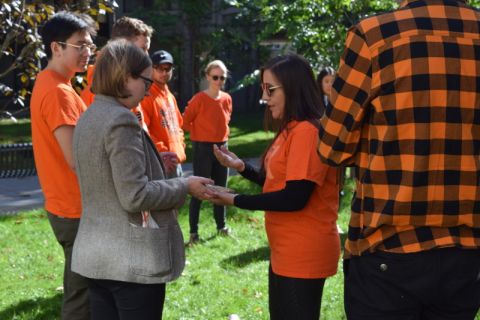
Interactive Blanket Exercise walks participants through 400+ years of Indigenous history
Participants at an experiential learning exercise commemorating the recent National Day for Truth and Reconciliation learned the impact of colonization on Indigenous peoples and the legal issues involved.
Hosted by Queen’s Indigenous Law Students’ Alliance (ILSA) in the courtyard outside the Law Building, the two-hour Blanket Exercise enabled members of the Queen’s community and the public to confront historic tragedies – such as the smallpox epidemic and residential schools – and to celebrate the positive impacts of Indigenous advocates and resistance.
“Participants learned how Indigenous people overcame effects of colonialism that damaged their populations,” says ILSA co-chair Noah Favel, Law’24. “They also learned how the Canadian government used, and continues to use, the Indian Act to subjugate Indigenous people on Turtle Island.”
The exercise was introduced by Dean Mark Walters and began with smudging, led by Director of Indigenous Initiatives and Equity, Diversity, and Inclusivity Stacia Loft. Professor Lindsay Borrows, who played the European settler, informed participants to leave the blankets (representing Canada), while ILSA co-chair Carolyn Alexander, Law’23, narrated. Queen's Law faculty members cited relevant legal issues and student participants read “scrolls” that provided historical facts. A closing circle provided participants a chance to reflect and decompress.
Developed in 1996 by the Canadian Aboriginal Rights Coalition in conjunction with Indigenous elders and teachers, the Blanket Exercise involves “walking through” periods of pre-contact, treaty-making, colonization, and resistance. Participants step onto blankets that represent the land, and into the role of First Nations, Inuit, and later Métis peoples. By engaging on an emotional and intellectual level, the exercise both educates and increases empathy.
Queen’s Law is dedicated to the principles of Equity, Diversity, Inclusivity, and Indigeneity (EDII) and the importance of reconciliation and restorative justice, to ensure that the law school embraces diversity and empowers individuals from culturally, racially, and socioeconomically diverse backgrounds to thrive.
By Nancy Dorrance